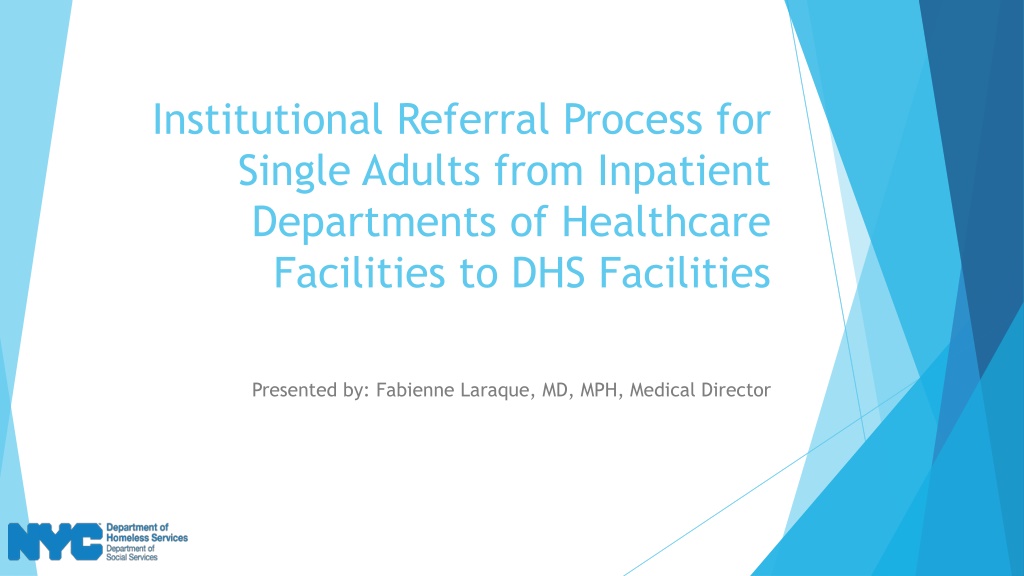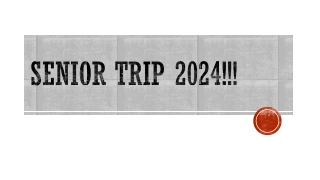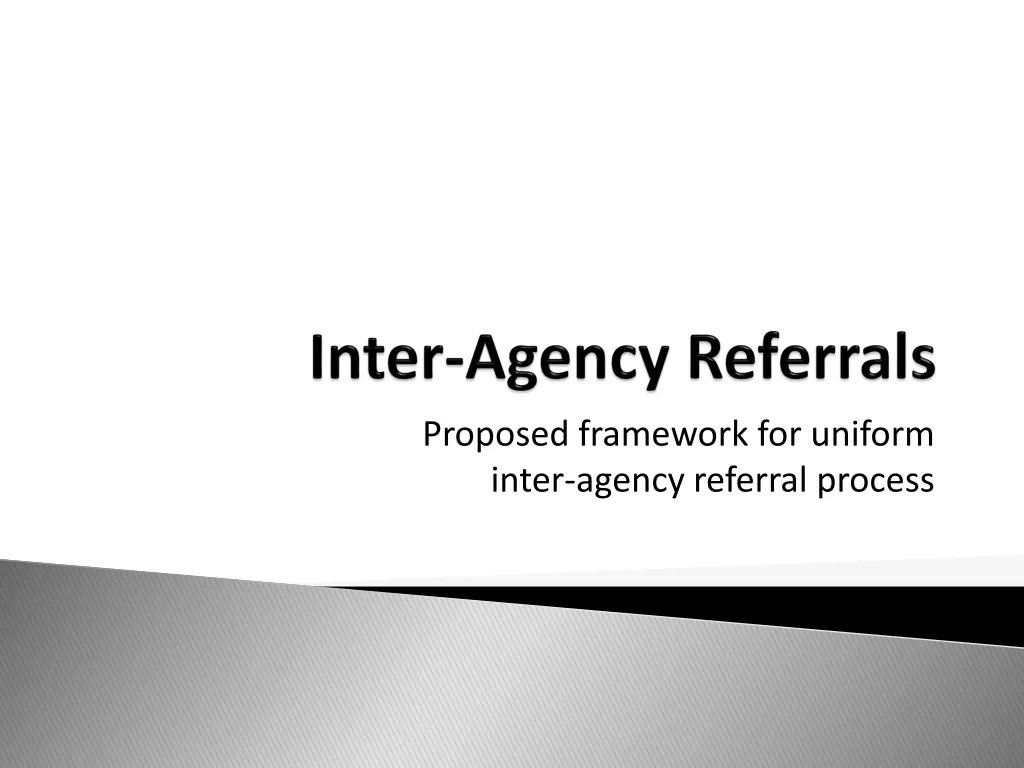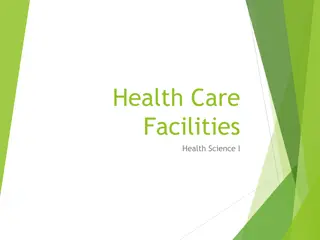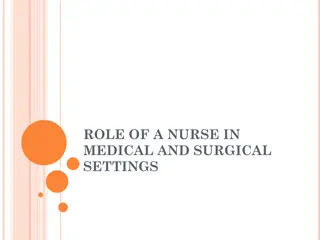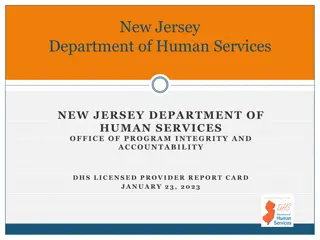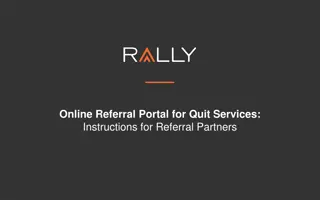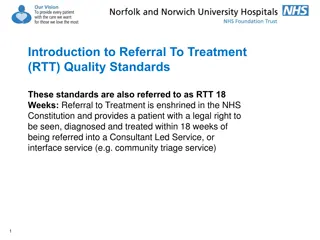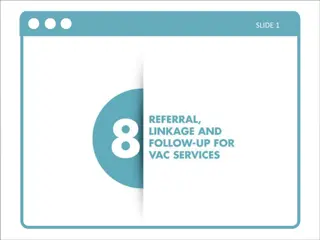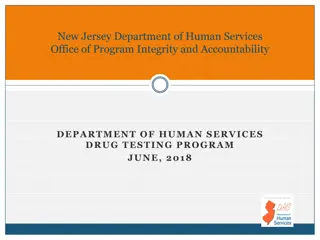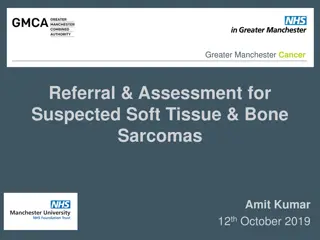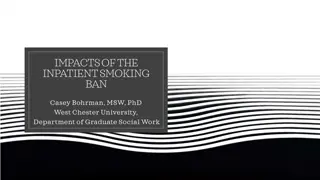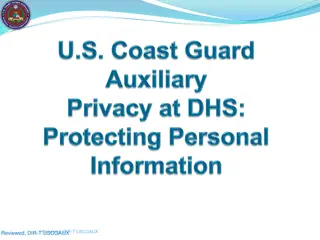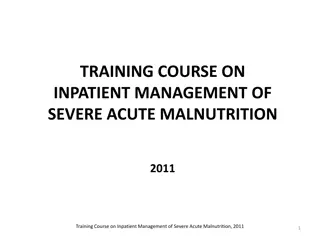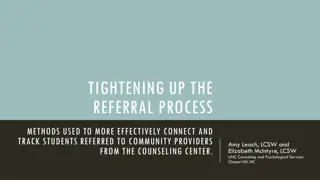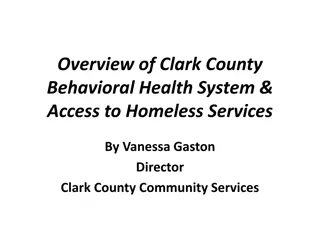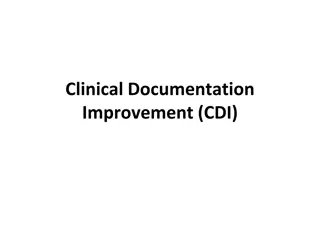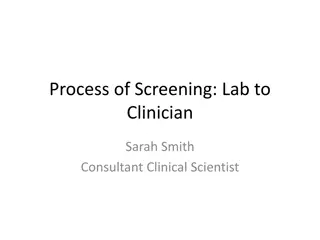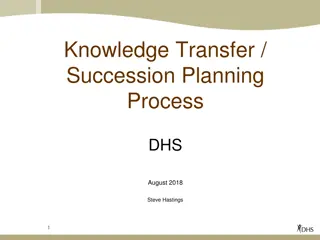Institutional Referral Process for Single Adults from Inpatient Departments to DHS Facilities
This presentation outlines the institutional referral process for single adults from inpatient departments of healthcare facilities to DHS facilities, focusing on screening referrals, coordinating care for medically appropriate individuals, and improving health outcomes. It covers goals, the shelter system overview, referral procedure, discharge guidelines, communication between healthcare facilities and DHS, and data collection.
Download Presentation

Please find below an Image/Link to download the presentation.
The content on the website is provided AS IS for your information and personal use only. It may not be sold, licensed, or shared on other websites without obtaining consent from the author. Download presentation by click this link. If you encounter any issues during the download, it is possible that the publisher has removed the file from their server.
E N D
Presentation Transcript
Institutional Referral Process for Single Adults from Inpatient Departments of Healthcare Facilities to DHS Facilities Presented by: Fabienne Laraque, MD, MPH, Medical Director
Overview Goals Overview of Shelter System The Referral Procedure 2018 New Form Guidelines Discharge Guidelines to Single Adult Shelters The Referral Process The HCF-DHS Referral Form Resources for Healthcare Facilities Identifying and Supporting Homeless Patients Communication Between HCF and DHS Staff Data Collection 1. 2. 3. 4. 5. 6. 7. 8. 9. 10. 11. 2
Goals of the Institutional Referral Procedure For clients new to DHS only, screen for referrals where insufficient placement efforts were made: HCF will attempt more placements or document their efforts in more details Screen for referrals of persons from health care facilities (HCF) who may be medically inappropriate for shelter and cannot obtain the level of care needed in shelter: Avoid shelter entry Place in appropriate level of care Coordinate discharge and care for persons discharged to shelter who are medically appropriate for shelter but have significant medical needs Communication Coordination Improve health outcomes Reduce high utilization 3
Overview of Shelter System There are no respite and no medical shelters in the DHS shelter system DHS programs within the scope of the Referral Form: Single Adult Shelters DHS Street Solutions sites Home care cannot be provided on an ongoing basis All single adult clients have to be able to perform their ADLs Pregnant women should be referred to family intake 4
Single Adult Shelter System Congregate settings with shared bathrooms 3 intake facilities: Men: 30th St. Women: Franklin St. and Help Women s Center (HWC) 6 single adult assessment shelters 4 for men 2 for women Has various shelters including: Employment General Mental health (MH) Substance use (SUD) And a small number of semi-specialized (veterans, young adult, LBGTQI, older adults) MH and SUD shelters are served by MH and SUD providers Shelters do not provide nursing services or 24 hrs medical services Home care is not possible except a limited number of services offered by Visiting Nurse Services on a case-by-case basis 5
DHS Street Solutions Drop-in Centers Showers, food, services 6 operational in all five boroughs Outreach 24/7 proactive canvassing, outreach, and engagement across the five boroughs, including streets and subways Safe Havens 16 Safe Haven shelters Solely take referrals from experienced street outreach teams Low-barrier programs and flexible requirements, no curfew and private or semi-private rooms with shared bathrooms Safe Haven staff are trained to manage the variety of behaviors and situations of chronically street homeless clients and most have on-site medical care Most have on site care at varying levels but they are not skilled nursing facilities, no DHS facilities provide skilled nursing or overnight medical services Please note that patients should never be discharged to the street 6
The Referral Procedure Provides: A clear understanding of how to refer a patient from a healthcare facility (HCF) to the DHS shelter system Overview of the shelter system Criteria for medical appropriateness and inappropriateness Information on alternatives to shelter for patients who are homeless or unstably housed Roles and responsibilities for DHS sites, the DHS Office of the Medial Director (OMD), and HCF Found at: https://www1.nyc.gov/site/dhs/shelter/singleadults/single-adults- hospital.page 7
2018 New Form Guidelines Single form sent at a single point in time Must be emailed to the appropriate DHS facility/office Please note that typing the form is best practice however if this is not possible handwritten forms will be accepted After July 1, faxes will not longer be accepted and all forms must be emailed to the appropriate site Determinations will be made with in 1 business day for inpatient stays less than 30 days, and within 2 business days for inpatient stays 30 days or more Specific criteria for medical appropriateness must be met Form, procedure, and training presentation found at: https://www1.nyc.gov/site/dhs/shelter/singleadults/single-adults-hospital.page Rigorous data collection methods 8
Discharge Guidelines for Single Adult Shelters HCF will receive a response from DHS within: 1 business day for stays less than 30 days 2 business days for stays 30 days or more Once a positive determination is received, HCF can discharge the client, but only between the hours of 9:00am and 3:00pm Mon-Fri Only patients who are able to live entirely independently (perform ADLs) are appropriate Patients may have limitations or special needs, including: Medical assistance up to twice per day by a visiting nurse Wounds that are not overly weeping and draining Needed access to a temporary bed for rest Use of ambulatory aids, enhanced equipment, or a first floor placement Medically necessary diet Use of an oxygen concentrator 9
Discharge Guidelines for Single Adult Shelters HCF should start the discharge process early in the hospital stay. For information on asking patients about their housing stability see slide 35 HCF should never discharge a patient without first submitting a Referral Form and receiving a positive determination For referral of clients new to DHS (or not at DHS >1 year), HCF are expected to assist clients in staying in current housing or finding alternatives to DHS shelter prior to submitting a referral form All follow-up information must be included in the referral form or be submitted to the receiving shelter on day of discharge at the latest HCF should submit clinical support documentation for reasonable accommodations with the Referral form for all appropriate cases 10
*New! Relative Exclusion Criteria If a patient meets these criteria, the DHS facility or DHS Medical Office will speak with the healthcare facility to confirm that the patient can manage all ADLs including the condition listed in this section, and is stable and independent. 12
Reasonable Accommodation Form https://www1.nyc.gov/assets/dhs/downloads/pdf/client-accom-request- form.pdf Asks for the patient information and reasonable accommodation need (can be filled out at the hospital) Include supporting documentation The form and supporting documentation should be printed and given to the patient to give to the shelter director upon arrival. 13
The Referral Process 1. After determining that a patient is homeless, the HCF should call the DHS Referral Line at 212-361-5590 to determine if a patient is a current DHS client. The HCF will receive: For returning clients, the name, phone number, and email of the shelter director of the patient s assigned shelter For new clients, the email of OMD or women s intake*: DHS-HCFreferral@dhs.nyc.gov for men, HCF-Referral@helpusa.org for women. 2. The HCF will complete**: All sections for patients who are new to the DHS single adult shelter system or have been out of shelter for 12 months or more All sections except Section 2 for patients returning to shelter/ safe haven *The HCF is responsible for obtaining consent to share clinical information with DHS prior to submitting the referral form **The form must be filled out as a fillable PDF, handwritten forms will not be accepted 14
The Referral Process HCF will email the completed form to the appropriate contact (shelter, safe haven, outreach team, women s intake, or medical office) 3. For all potentially eligible clients, it is best practice that an HRA 2010e supportive housing application be completed HCF should not submit referrals for clients who meet the absolute exclusion criteria Upon receipt of the referral, the form will be reviewed to determine if additional information is needed or the client is medically appropriate 4. The reviewer will respond via email with a determination regarding medical appropriateness within 1 business day for stays of less than 30 days, and 2 business days for stays of 30 days or more 5. Please note that if the DHS reviewer requests additional information the 1-2 day clock pauses until requested information is received from the HCF Upon receipt of a positive determination, the HCF may discharge the patient anytime between 9:00am and 3:00pm, Mon-Fri, after coordinating with the receiving shelter for persons who still have serious medical needs 6. 15
The Referral Process - Discharge Coordination The HCF will be asked to: Make clear on the referral form if the client has complex medical needs Provide clinical support documentation for a reasonable accommodation if necessary For patients with persistent medical needs and those who require a bed the same day, the HCF will contact the destination DHS facility prior to discharge to discuss the need for a bed at time of discharge The shelter/safe haven and HCF are jointly responsible for coordinating the discharge of the client The HCF must: Arrange all appropriate follow-up care including transportation (or establish that the client can independently travel to all appointments) Provide a minimum of 2 week medication supply to the patient upon discharge unless otherwise directed Provide oxygen concentrator if medically appropriate for patients requiring oxygen therapy Communicate all follow-up information with the destination shelter staff 16
The Referral Process - Inappropriate Referrals If a patient arrives and the referral is inappropriate or incomplete due to: Inappropriateness due to medical reasons, No referral form was sent, or Lack of discharge planning; The DHS site will submit a notification to their medical provider if they have one, or otherwise DHS OMD, via their Program Administrators The medical provider or OMD will follow up or file a complaint with the HCF, relevant HCF association, and the appropriate state agency Quarterly reports on inappropriate referrals will be produced 17
The Referral Process- Roles and Responsibilities OMD Oversee and provide support and training for the referral procedure Review referrals for men new to the DHS single adult shelter system Collect and analyze referral data DHS site staff Review incoming referrals from women new to the DHS single adult shelter system and all returnees Communicate with the HCF regarding the determination and discharge coordination Alert Program Administrator and their medical provider and as needed OMD, about inappropriate referrals Collect and report data HCF staff Assist patient in avoiding homelessness prior to sending referral form Complete and send referral form prior to patient discharge Follow this guidance and discharge on Mo-Fri 9am-3pm Coordinate all necessary follow-up care for patient, provide 2 weeks of medications and communicate arrangements to shelter staff 18
QUESTIONS??? 19
The Referral Form Introduction and directions Section 1: Patient Demographic and Hospital Information Section 2: Past and Current Housing History Section 3: Clinical Information Section 4: Functional Status: Activities of Daily Living Section 5: Discharge Plan Section 6: Treating Team Signature Shaded sections (in yellow) are required to be filled out by the HCF 20
The Referral Form Introduction and directions Includes directions on completing the form, where to send, and timeline Has information on medical appropriateness criteria, relative exclusion criteria Information for DHS use only in determining appropriateness of referral and other data collection variables All required sections will be shaded in YELLOW 21 Guidance for Healthcare Facilities Completing the New Institutional Referral
The Referral Form Absolute and relative exclusion criteria Includes information on medical appropriateness criteria and relative exclusion criteria If a patient meets any of the conditions listed in the absolute exclusion criteria then a referral should not be sent If a patient meets any of the conditions listed in the relative exclusion criteria a referral may be sent but follow-up information may be requested 22 Guidance for Healthcare Facilities Completing the New Institutional Referral
The Referral Form DHS determination and HCF contact information DHS determination section Should only be completed by DHS site staff or OMD staff Must be filled out upon receipt of the referral and receipt of the client HCF section (bottom half of the form) should be filled out by HCF Required for all referral submissions 23 Guidance for Healthcare Facilities Completing the New Institutional Referral
The Referral Form Section 1: Patient Demographic and Hospital Information Basic patient demographic information Contact information for the HCF treatment team staff Instructions on referring the patient to the correct DHS facility or OMD Required for all referral submissions 24 Guidance for Healthcare Facilities Completing the New Institutional Referral
The Referral Form The DHS ADL Assessment form Patients must score a 12 to be considered appropriate for shelter If a patient scores less than a 12 they are not appropriate for shelter and the HCF staff should not continue to fill out the referral form. Required for all referral submissions Guidance for Healthcare Facilities Completing the New Institutional Referral
The Referral Form Section 2: Past and Current Housing History Prior housing history Only one radio button should be selected Reasons for current homelessness Only one radio button should be selected Efforts to place patient in alternative housing Please list all attempts Required only for NEW clients 26 Guidance for Healthcare Facilities Completing the New Institutional Referral
The Referral Form Section 2: Past and Current Housing History Prior housing history Only one radio button should be selected Reasons for current homelessness Only one radio button should be selected Efforts to place patient in alternative housing Please list all attempts Required only for NEW clients 27 Guidance for Healthcare Facilities Completing the New Institutional Referral
The Referral Form Section 3: Clinical Information Reason for current admission Only one radio button should be selected Information on client if admitted due to violent or threatening behaviors If patient was admitted due to violent or threatening behaviors, follow up questions 1-5 are required Arson and hospitalization history Diagnoses upon discharge information Required for all referral submissions 28
The Referral Form Section 3: Clinical Information Reason for current admission Only one radio button should be selected Information on client if admitted due to violent or threatening behaviors If patient was admitted due to violent or threatening behaviors, follow up questions 1-5 are required Arson and hospitalization history Diagnoses upon discharge information Required for all referral submissions 29 Guidance for Healthcare Facilities Completing the New Institutional Referral
The Referral Form Section 3: Clinical Information Reason for current admission Only one radio button should be selected Information on client if admitted due to violent or threatening behaviors If patient was admitted due to violent or threatening behaviors, follow up questions 1-5 are required Arson and hospitalization history Diagnoses upon discharge information Required for all referral submissions 30 Guidance for Healthcare Facilities Completing the New Institutional Referral
The Referral Form Section 4: Functional Status: Activities of Daily Living Information on relative exclusion criteria Any reasonable accommodation needs Link to the Reasonable Accommodation form online Durable medical equipment needs Medication list- can be attached or copy/pasted into the textbox provided Required for all referral submissions 31 Guidance for Healthcare Facilities Completing the New Institutional Referral
The Referral Form Section 4: Functional Status: Activities of Daily Living Information on relative exclusion criteria Any reasonable accommodation needs Link to the Reasonable Accommodation form online Durable medical equipment needs Medication list- can be attached or copy/pasted into the textbox provided Required for all referral submissions 32 Guidance for Healthcare Facilities Completing the New Institutional Referral
The Referral Form Section 5: Discharge Plan All follow-up appointments that have been made at time of referral submission If the HCF is still making follow-up plans, submit plans by day of discharge All discharged patients must have at least a follow-up appointment with a PCP Please note that referrals to a walk in clinic are not acceptable follow-up plans Required for all referral submissions 33 Guidance for Healthcare Facilities Completing the New Institutional Referral
The Referral Form Section 6: Treatment Team Approval Must be approved by at least one member of the treatment team Required for all referral submissions 34 Guidance for Healthcare Facilities Completing the New Institutional Referral
QUESTIONS??? 35
Identifying and Assisting Homeless Patients To facilitate a faster referral and ensure that DHS has time to review all incoming referrals, it is necessary to identify if a patient is homeless early in the hospital stay. The following questions may be asked to ascertain if a patient is or may become homeless during their inpatient stay: 1- Where did you stay last night? 2- Can you return to this place upon discharge? 3- If not, is there other housing where you can stay upon discharge? State that they will not be treated differently at the hospital if they are homeless or unstably housed. Identifying social determinants of health is critical to improving health outcomes and reducing inappropriately high utilization of medical services See Billioux A, Standardized Screening for Health-Related Social Needs in Clinical Settings. National Academy of Medicine, 2017. 36
Identifying and Assisting Homeless Patients If the patient cannot return to housing, the HCF should assist them in any referrals to HRA or other housing support resources If the patient is being discharged after a long inpatient stay the HCF should provide evidence of applications to permanent housing or support programs If a patient needs assistance with ADLs or skilled nursing care, they need to be referred elsewhere If the patient stayed on the street or in a shelter, please call the DHS Referral Line at 212-361-5590 If the patient stayed at a friend s house, at a relative s house, etc., and state they cannot return there upon discharge, please call HRA at: 718-557-1399 If a patient has development disabilities, contact OPWDD at: 646-766-3276 37
Assisting Patients At-Risk of Homelessness If the patient has a place to return but this housing is at risk: To refer to Homebase for eviction prevention, mediation with landlord or primary tenants, or temporary assistance, call 311 for the nearest Homebase office or go to https://www1.nyc.gov/site/hra/help/homebase.page. Please call to make an appointment. If the patient has rent arrears, HRA provides grants at local Job Centers in order to cover arrears and prevent eviction https://www1.nyc.gov/site/hra/help/cash- assistance.page For ongoing rental assistance, SEPS is the ongoing rental assistance program available in the community for single adults who meet the eligibility criteria (see next slide). 38
Assisting Patients At-Risk of Homelessness SEPS is available for single adults living in the community who meet the following criteria: Apply for SEPS at Riseboro for housing in Brooklyn, Queens and Staten Island and at Bronxworks in the Bronx and Manhattan Income below 200% of the federal poverty line Riseboro - Brownsville 145 East 98th Street Brooklyn, NY 11212 A veteran at-risk of shelter entry OR Call 917-819-3200 for an appointment In eviction proceedings or evicted within the past year and one of the following criteria: Riseboro - Bushwick 1475 Myrtle Avenue Brooklyn, NY 11237 Active APS case Call 347-295-3738 for an appointment Shelter history Bronxworks Rent controlled apartment 630 Jackson Avenue, Bronx, NY 11455 Call 929-252-7110 for an appointment 39
What is Supportive Housing? Permanent affordable housing with voluntary support services. Congregate: One building, often combined with affordable housing for the community Scattered-site: Private market apartments rented in the community in which clients are visited by case managers Clients have their own units and pay 30% of their income toward rent Access to on-site social services to promote community integration and support to achieve maximum independence Jericho Project s Kingsbridge Veterans Residence CD 14
Who is Served in Supportive Housing? Homeless individuals living with mental illness and/or struggling with substance use disorders Individuals with HIV/AIDS Youth aging out of foster care High-risk homeless families in which the head of household living with mental illness, substance use disorders, and/or HIV/AIDS Homeless veterans with a disabling condition High-cost Medicaid recipients who are homeless and living with a disabling condition
Services Provided in Supportive Housing Person-centered planning to develop effective goals related to housing stability, financial security, and progress toward recovery. Evidence based approaches such as Motivational Interviewing, Health and Wellness Self-Management, and Trauma Informed case management. Utilization of peer services and tenant participation activities for inclusive and comprehensive program operations. On site services and community service linkage to support residents to achieve their recovery goals and foster independence.
Mayoral Commitment: Creating 15,000 Supportive Housing Units in Next 15 Years Estimated Projections Population Housing Type Total by Population 10,673 Single Adults With SMI/SUD 5,155 5,518 Congregate Scattered-Site 1,004 Adult Families Head of Household with SMI/SUD 341 663 Congregate Scattered-Site Families with Children 2,087 654 982 Head of Household with SMI/SUD Congregate Scattered-Site 361 90 Congregate Scattered-Site Young Adults, Ages 18-25 w/ Children or Pregnant Women Young Adult Singles, Ages 18-25 1,236 989 247 Congregate Scattered-Site TOTAL 15,000
Applying for Supportive Housing HRA s Placement Assessment and Client Tracking (PACT) unit reviews housing applications submitted by acute and long-term psychiatric hospitals, shelters, outreach teams, correctional facilities, and community-based agencies. This initiates the approval and placement process for a continuum of supportive housing options. Annually, the PACT unit reviews about 25,000 applications and 63% are approved for NY/NY and/or SMI housing. Generally, an application for supportive housing requires the following: Psychiatric evaluation, by an appropriately licensed professional Psychosocial Assessment Housing documentation (unsheltered stay) The psychiatric and psychosocial assessment must be completed no more than 6 months prior to submission of the application. Application criteria can be found in the What s New section of PACTWeb.
The Supportive Housing Coordinated Assessment Survey Prior to initiating a supportive housing application, it is recommended that a coordinated assessment survey is completed. The Coordinated assessment survey: Is accessible to all PACT users Generates a list of supportive housing and rental subsidies the household is potentially eligible for If the Survey returns a match on a client: income and identifying documents (i.e. SS card, birth certificate) and prior supportive housing applications for the last five years are available
Supportive Housing Referral/Placement Placement Agencies assist in referral and placement process: For NY/NY III approved individuals or families, PACT system electronically notifies the referral source and the appropriate Placement Agency HRA/DSS, HASA, ACS, SOMH HRA/DSS makes electronic referrals of eligible clients for six (6) of the NY/NY III categories of permanent supportive housing NYC 15/15 approvals- Referrals/Placement Agency HRA/DSS For SMI and NY/NY I/II, the approved individuals are referred/placed by the referral source or through SPOA (managed by CUCS) CUCS publishes a NYC Vacancy Update every two weeks with housing provider intake contacts CUCS provides housing consultation and referral assistance by phone
Supportive Housing Resources Contact the HRA technical user support for training and access to the Supportive Housing Application at 929-221-4515. Contact CUCS housing referral assistance at 212-801-3333. Visit CUCS website for SPOA process, vacancy update and other resources: cucs.org For placement information, or to find out the status of an application, contact Fuad Rasulov, Program Manager at (212) 607-2409 or rasulovf@hra.nyc.gov.
Communicating with DHS Site Staff Communication between DHS sites and HCF is crucial for the wellbeing of our patients/clients HCF and DHS staff who are located within a short distance of each other are encouraged to set up visits and have the staff tour each facility to better understand the workflows and pathways of the other facility HCF will be provided with name, phone number, and email of the DHS site reviewer (on-site director or intake coordinator) when calling the DHS Referral Line to facilitate communication HCF will be provided a list of shelter/sites directors name, telephone number and email address Phone numbers and emails of referring HCF staff and treating physician should be noted on the referral to facilitate care coordination and communication 48
Sending and Receiving Emails HCF are required due to HIPAA regulations to send encrypted emails. These emails may be sent as normal or via a third party encryption site such as Kiteworks depending on the email server that is used by the referring healthcare facility DHS recipients of emails may need, depending on the type of encryption to register and log into an encryption site such as Kiteworks. OMD suggests that DHS site staff set up the same username and password for all encryption sites that are used to access emails. This username and password should be shared with all individuals who will be receiving encrypted emails. If DHS staff have any questions or concerns about accessing encrypted emails through a third party, please contact the Office of the Medical Director at DHS- HCFReferral@dhs.nyc.gov 49
The Referral Process- Workflow The HCF calls HCF referral line at 212-361-5590 to determine if the client has a current shelter of record A healthcare facility (HCF) determines they have a homeless patient with no alternative options Patient was in shelter within past year and is willing to return Patient has not been in a DHS shelter ever or within in the past year but is willing to go Patient was in a Safe Haven within the past year and is willing to return The patient is street homeless and is unwilling to go to shelter HCF fills out Referral Form at https://www1.nyc.gov/site/dhs/shelter/singleadults/single-adults-hospital.page, and emails the form to the receiving shelter, Safe Haven, Outreach Team, Medical Director s Office, or women s intake as appropriate If the patient can be accommodated, appropriate discharge plan is made and patient is discharged to the Safe Haven HCF will receive a determination regarding the medical appropriateness of the patient within 2 business days HCF contacts borough outreach team and works with the team to create an appropriate discharge plan If the patient is not appropriate for discharge to a DHS shelter, the HCF may be offered resources if available to create a safe discharge plan for the patient to a more appropriate setting If the patient is appropriate for shelter the HCF can plan to discharge the patient between the hours of 9:00am and 3:00pm Monday-Friday If the patient cannot be accommodated, the HCF and Safe Haven will communicate 50
